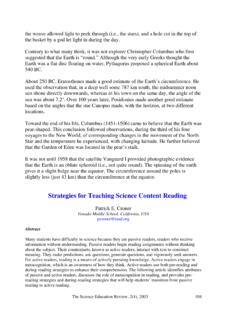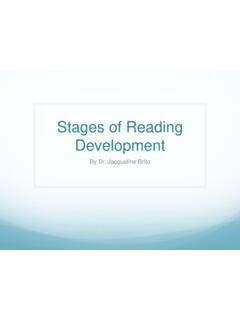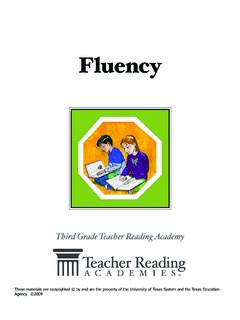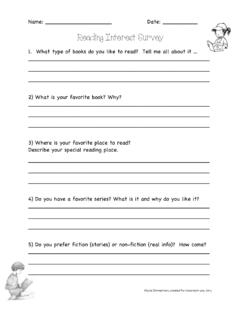Transcription of Oral language and beginning reading: Exploring …
1 Forum on Public Policy 1 Oral language and beginning reading : Exploring connections and disconnections Susan Hill, Associate Professor in Early Childhood Education, University of South Australia ABSTRACT The purpose of this study was to explore the connections between young children s oral language vocabulary and children s reading of written language in beginning reading books. Oral language has been viewed as the foundation for emergent reading development as it provides the semantic base, syntactic base and phonological base for successfully moving from oral to written language .
2 In fact in the years before school the development of children s oral language in the home environment is viewed as an important factor for early reading success. The research reported in this study involved children in their first year of school in a socioeconomically diverse community. The findings revealed disconnections between children s receptive oral language vocabulary and early reading . Children with English as a Second language scored low on oral language vocabulary but high on reading levelled texts.
3 Children with high scores on oral vocabulary scored low on reading levelled texts and a small group of Aboriginal children scored low on both oral and written measures. This study raises questions about the view that oral language neatly underpins reading development and suggests that learning to read is akin to learning a second language for all children. And when he came to the place where the wild things are they roared their terrible roars and gnashed their terrible teeth and rolled their terrible eyes .. Where the wild things are (Sendak 1963).
4 Introduction Oral language has long been regarded as the foundation for beginning reading as children draw on the meaning, syntax and the phonology of spoken language as a bridge to emergent literacy. However, many teachers have commented on the vast diversity in the oral language capabilities of children starting school. In this case study of children in a small metropolitan school in Adelaide the teachers were concerned that some children were beginning school with relatively small vocabularies and some used forms of nonstandard oral language .
5 The teachers thought that children with nonstandard forms of English syntax may have difficulty using the syntax of books or book language to aid their beginning reading . Also many schools have increasing numbers of children with English as an additional language as well as children who speak languages which have not been recorded in written form. The concern of these teachers led to a series of questions which are explored further through a review of literature and several case studies involving young children who are beginning to read emergent texts in their first year of school.
6 Oral language as a predictor of early reading The importance of oral language as a predictor of future literacy achievement is supported by research across a number of oral language domains. Young children need to have control over several aspects of oral language prior to starting the beginning to read process Forum on Public Policy 2 phonology, vocabulary, syntax , discourse and pragmatics (Snow, Burns and Griffin 1998). Research has shown that the size of children s vocabulary at age 3 is strongly associated with learning to read and reading comprehension at the end of third grade (Hart and Risley 2003).
7 Dickinson and Tabors (2002) found the scores that kindergarteners achieved on measures (receptive vocabulary, narrative production, and emergent literacy) were highly predictive of their scores on reading comprehension and receptive vocabulary in fourth and seventh grade. There are several characteristics of oral language : word meanings (semantics), sentence structure ( syntax ), the architecture of words and word parts (morphology) and sounds (phonology) (Richgels 2004). The particular characteristics of oral language phonology, vocabulary and syntax will be explored and compared to written language .
8 Oral language and written language Oral language is all around us and we take it for granted, unaware of the choices we make or the form of language we use. However, when writing, written language demands that there is conscious attention to form and this involves choices to do with semantics, syntax and phonology. For example, a four year old beginning invented speller who wants to write I have a chair has to consider word order and meanings and when writing the word 'chair' the child needs to pay attention to phonemes in a way that they never had to when learning to speak (Richgels 2004).
9 The importance of phonological awareness cannot be underestimated and Richgels (2004) points out that children are born able to perceive phonemes for example from birth they can perceive the difference between /s/ and /z/. Richgels (2004) also writes that in the study of oral language the greatest attention in research has been on phonology, and even then, mostly on a subset of phonological knowledge; the awareness of phonemes. The syntax of oral language has been identified as important for beginning reading .
10 It is argued that children with a high competence in oral language sentence construction bring rich language to the new task of reading and writing. The Record of Oral language (ROL), (Clay et al. 2007) was developed to measure children s syntax . However many of the sentences in the ROL have a structure similar to written language which uses more complex embedded syntax structures. In contrast to written language the syntactic structure of oral language is more likely to be fragmented with clauses and phrases strung together, false starts and repetitions and abandoned intonation units (Purcell-Gates 2001).



















